- Austausch & Vernetzung
- Wissen & Lernen
- Advocacy
- Unsere Themen
Für uns ist klar, die sexuelle Gesundheit von Jugendlichen wird immer noch stiefmütterlich behandelt und ist nicht da, wo sie sein sollte. Unsere Lösung dafür: Innovative und partizipative Programme und Projekte lancieren! Innovative Projekte, die den Zeitgeist junger Menschen spiegeln, die die Jugendlichen in ihrem Lebensumfeld abholen, sie in ihrem Potential stärken und ihnen Perspektiven aufzeigen.

Unsere Fachtagung im letzten Jahr zum Thema «Sexual health and rights under pressure: resistance and challenges» zeigte deutlich, dass sich Taboos und Restriktionen in Bezug auf die sexuelle Gesundheit weltweit verstärken. Konservativ-fundamentalistische Kreise und Strömungen verwehren auch Jugendlichen wertvolle Informationen in Bezug auf ihre sexuelle Entwicklung.
Um gegen diese verstärkt aufkommenden restriktiven Normen und Taboos vorzugehen, sind innovative Ansätze gefragt, die idealerweise von den Jugendlichen und jungen Menschen selbst initiiert werden. Um junge Menschen für diesen sozialen Wandel zu begeistern, sind Visionen notwendig, die sie überzeugen. Sie müssen unmittelbar angesprochen werden, beispielsweise durch sie betreffende Probleme oder Fragestellungen und ihnen zeigen, wie ihre Lösung oder ihr Ansatz einen Unterschied machen kann. Diese Visionen sollten auch ihre Werte, Authentizität und Glaubwürdigkeit als Vordenker:innen widerspiegeln.
Unsere Fachtagung am 24. April 2024 in Bern widmet sich genau diesem Thema: Wir stellen innovative Ansätze vor, die wenig Geld kosten und vor Ort entstanden sind. Sehen Sie, wie der Einsatz von «photo voice» über Cybergewalt bis hin zu einer lokal entwickelten App in Äthiopien, die Lebensrealität junger Menschen verändern können. Vorgestellt wird auch ein spannendes «Game Changer»-Projekt, das sich mit dem Unternehmertum junger Menschen in Sambia beschäftigt.
Und wir können bereits ankündigen, dass Dr Venkatraman Chandra-Mouli, ehemaliger WHO-Mitarbeiter, innovative Programme zur Sexualerziehung vorstellen wird. Wir freuen uns auf eine Fachtagung mit Ihnen, die inspiriert, Kontroversen aufzeigt und Ideen entwickelt. Wie immer im Hotel Kreuz in Bern.
Carine Weiss
Netzwerk Medicus Mundi Schweiz
E-Mail

Medicus Mundi Switzerland Collectively, young people have urgent and vast needs for policies and programs that ensure their improved sexual and reproductive health and rights (SRHR). There are numerous innovative initiatives and projects to improve young people’s sexual and reproductive health and rights and we want to hear about them. Despite the significant progress in SRHR for young people topics around sexuality remain stagnant due to social norms, stigma, discrimination and taboos. Innovative approaches are needed to reach young people and to improve their access to SRHR.

Summary of the Symposium 8 February 2024
"Access to drugs, diagnostics and vaccines remains a challenge in many in low- and middle-income countries. Today, 8 February 2024, Swiss TPH hosted a symposium bringing together 350 experts and key players from academia, the pharmaceutical industry, politics and product development partnerships to assess current strategies and foster synergies in research, drug development and medicines’ implementation.

On December 15, 2023, the World Health Organization officially added noma to the list of neglected tropical diseases, which will make it easier to combat and research this poverty-related disease. Swiss TPH and the University of Basel both played a key role in ensuring noma was recognized in this manner. By Christian Heuss
"Many people prefer to look the other way when it comes to this disease, as the sight of young children suffering from its effects is unbearable. It causes open wounds on the face and whole sections of the cheek appear to have been eaten away. Children who survive the disease remain disfigured throughout their lives and struggle with speech disorders and eating problems. Noma typically affects children between two and six years of age. The disease starts seemingly harmless as sore gums and mild bad breath. At this stage, the disease would be easy to cure with a broad-spectrum antibiotic. If left untreated, the infection spreads to tissue necrosis within a few days. First soft tissues die, then cartilage structures and bones are attacked and literally eaten away by the infection."
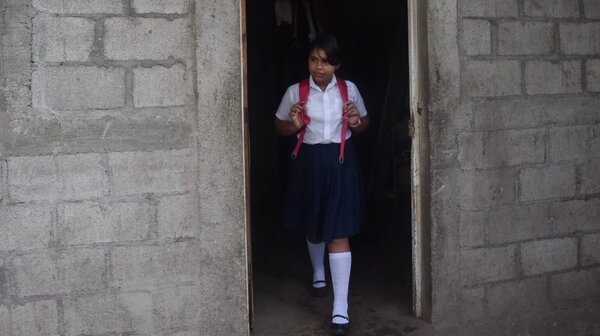
"Nicaragua verzeichnet eine der höchsten Teenageschwangerschaftsraten weltweit. Auch Gewalt gegen Mädchen und Frauen gehört zur Tagesordnung. Mit unserer Arbeit tragen wir dazu bei, die ganzheitliche Entwicklung von Jugendlichen zu fördern, ihr Recht auf ein gewaltfreies Leben zu stärken und die Ausübung einer sicheren und selbstbestimmten Sexualität zu unterstützen."
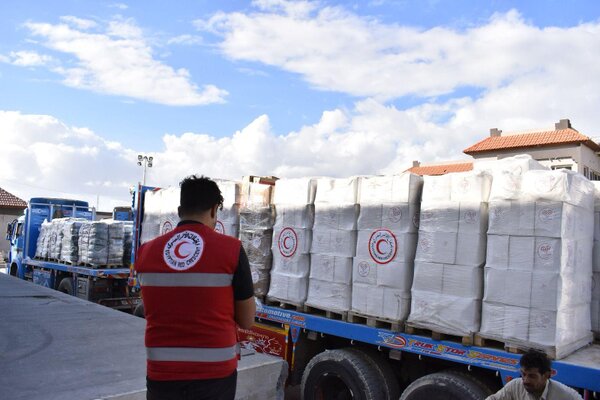
"Die humanitäre Krise in Gaza spitzt sich mit der Dauer des Konflikts immer mehr zu. Mit täglichen Hilfsgüter-Lieferungen aus Ägypten setzt die Rotkreuz- und Rothalbmondbewegung alles daran, die Not der Menschen etwas zu lindern. Das Schweizerische Rote Kreuz (SRK) unterstützt diese Hilfe unter anderem mit Spezialisten aus seinem Nothilfe-Personalpool."

"Zwei Jahre nach der Eskalation des Konflikts in der Ukraine arbeitet das Schweizerische Rote Kreuz weiter für die im Land vertriebenen oder ins Ausland geflüchteten Menschen. In der Schweiz unterstützt es ihre Integration, in der Ukraine hilft es den Vertriebenen, die alles verloren haben."
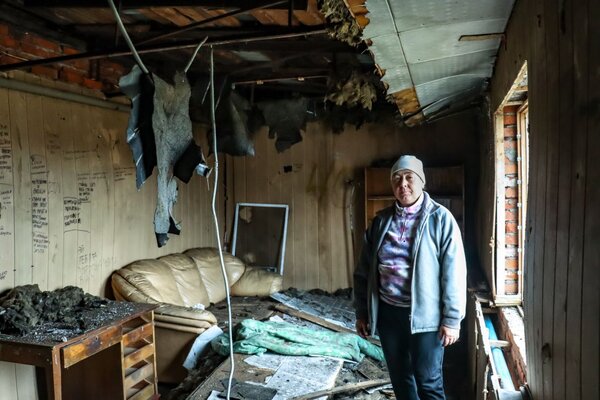
"Der massive Einsatz von Explosivwaffen in der Ukraine hat Strassen, Spitäler und Schulen zerstört und ganze Landstriche isoliert. Wir weisen auf die Gefahren hin, die von Blindgängern ausgehen, und auf die wachsenden Bedürfnisse der Menschen, die nicht aus den Kampfgebieten fliehen konnten."
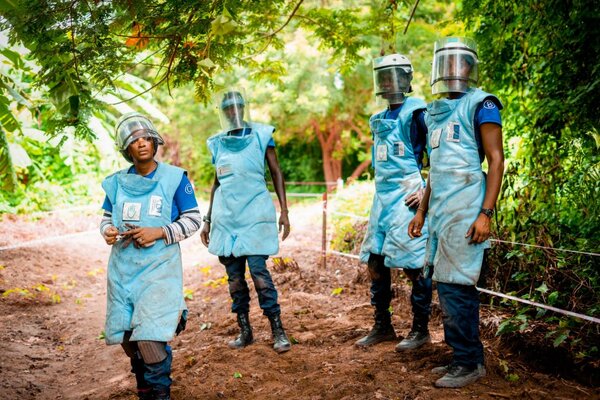
Schlüpfen Sie in die Schutzkleidung unserer Minenräumer:innen im Senegal und erleben Sie einen Tag an ihrer Seite
"Aufstehen im Morgengrauen: Die Entminungsteams starten früh, um vor der grössten Hitze fertig zu sein. Erster Schritt im Büro: Material in die Fahrzeuge laden, um ins 40 Minuten entfernte Dorf Kouring zu fahren. In der Casamance gibt es auch heute noch viele gefährliche Gebiete, die mit Sprengkörpern verseucht sind. Zusätzlich zu den berufsbedingten Risiken waren die Minenräumer:innen bis vor Kurzem mit der Bedrohung durch bewaffnete Gruppen konfrontiert. Um solchen Vorfällen vorzubeugen, stellen wir sicher, dass alle notwendigen Massnahmen getroffen werden, um die Sicherheit unserer Teams zu gewährleisten."
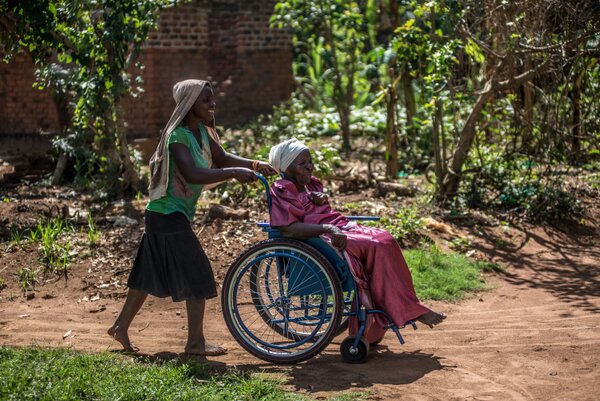
"Der Bundesrat verabschiedete am 24. Januar seinen Zwischenbericht zur Umsetzung der Agenda 2030 für nachhaltige Entwicklung sowie den dazugehörigen Aktionsplan für die Jahre 2024 bis 2027. Konkrete und wirksame Massnahmen fehlen. Und einmal mehr werden Menschen mit Behinderungen im globalen Süden zurückgelassen. Die zivilgesellschaftliche Plattform Agenda 2030 nahm noch am selben Tag zum Zwischenbericht und zum Aktionsplan Stellung. Als Mitglied der Kerngruppe der Plattform Agenda 2030 teilt die CBM Christoffel Blindenmission Schweiz deren Enttäuschung."

Pharmaciens Sans Frontières Suisse fait appel à vous pour rejoindre son équipe le dimanche 2 juin 2024 à Genève lors de la course Race for Gift !
"Il s’agit d’une course/marche caritative pour laquelle vous mobilisez votre réseau afin de récolter des fonds qui financeront le travail de PSF Suisse. En participant à Race for Gift, vous apportez une contribution précieuse à l’association qui a pour mission l’accès aux soins de qualité, partout et pour tous·tes, sans aucune discrimination. Forte de plus de 30 ans d'expérience, PSF Suisse développe des projets de coopération au développement au Liban, à Madagascar, en Tanzanie, au Soudan du Sud et en Suisse. Toutes les informations sur nos projets sont à retrouver sur notre site psf.ch."
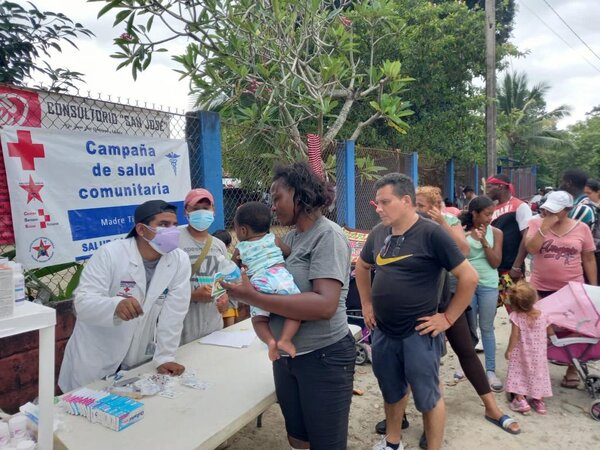
Le bulletin nº190 de mars 2024 de la CSSR
"La CSSR transmet volontiers l'information suivante: La Centrale Sanitaire Suisse Romande publie son premier bulletin de l'année. Un bulletin sur le droit international et ses échecs, sur son nouveau projet au Mexique avec son partenaire Madre Tierra Mexico, sur les messages des autorités suisses vis-à-vis du Nicaragua, et sur la situation politique qui se détériore en Équateur. On vous souhaite une bonne lecture!"

"Ghana’s Parliament unanimously passed one of the world’s most draconian anti-LGBTIQ Bills on Wednesday, including a mandatory three-year prison sentence for a person who simply “identifies” as lesbian, gay, bisexual, transgender, intersex or queer. Anyone funding an LGBTIQ organisation also faces five years in prison, while LGBTIQ “advocacy” involving children will result in a 10-year prison sentence – a clause that is so wide it could be applied to sex education in schools. Any media that reports or broadcasts anything related to LGBTQ+ people or activities also face fines and possible prison sentences."

Classification of the “international LGBT movement” as an extremist organisation is likely to worsen mental and sexual health. Ed Holt reports.
“It's hard to imagine what the state could do to make things more difficult for LGBT people in Russia. Before, there was hatred for LGBT people at a societal level, but now the state has declared something that doesn’t even exist to be a terrorist organisation. It's terrifying”, said Dominik (name has been changed for safety reasons). An LGBT activist in St Petersburg, Dominik, like many other members of Russia's LGBT community, is coming to terms with a ruling by the Russian Supreme Court on Nov 30, 2023, declaring the “international LGBT movement” an extremist organisation."
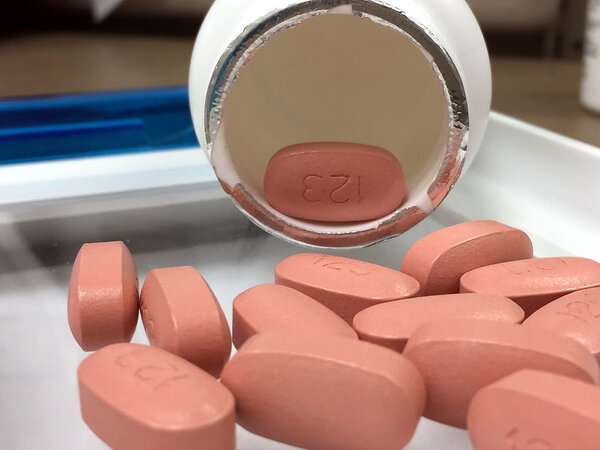
As countries work to reach the goal of ending AIDS as a public health threat by 2030, planning is urgently needed for sustaining the gains from the HIV response beyond 2030.
"With that in mind, UNAIDS has released the “HIV Response Sustainability Primer” which proposes a new approach to ensure the sustainability of the HIV response. This holistic approach includes programmatic, political, policy-related and financial aspects of the HIV response. The new Primer provides the rationale, the definitions, and an in-depth explanation of this new sustainability approach. “The moment is right, the imperative is now, the global HIV community must come together to dialogue about what is needed to sustain the HIV response by and beyond 2030,” says Jaime Atienza, Director of Equitable Financing at UNAIDS. “We are calling on leaders to initiate national conversations about the future state of a sustained HIV response, and the transformations needed to achieve and sustain impact, by and beyond 2030, including looking at the policy changes, donor commitment and investments needed to translate them into results and concrete changes at country level.”
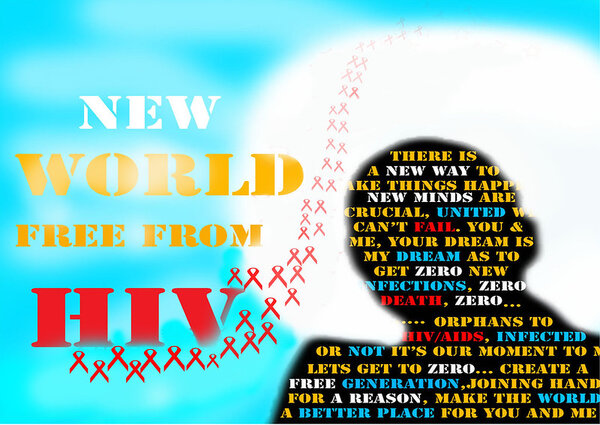
"The U.S. President’s Emergency Plan for AIDS Relief (PEPFAR), led by the State Department’s Bureau of Global Health Security and Diplomacy, announced a new $20 million initiative to strengthen youth-focused HIV programming, center youth HIV leadership, and promote innovation in HIV prevention, case finding, and treatment outcomes in PEPFAR-supported countries. Ambassador Dr. John Nkengasong, U.S. Global AIDS Coordinator and Senior Bureau Official for Global Health Security and Diplomacy, made the announcement about PEPFAR’s Youth Initiative during a hybrid youth special session in Cape Town, South Africa, alongside thousands of youth from around the world."
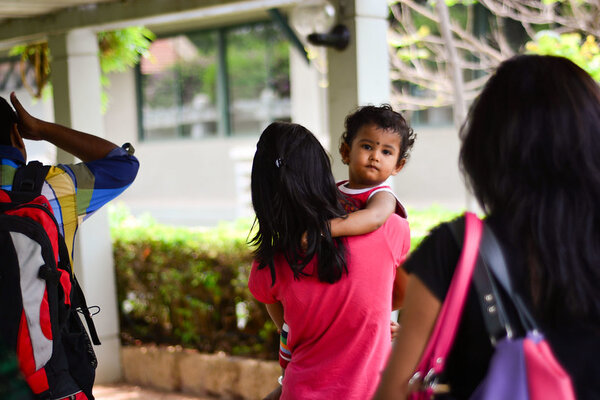
"Divyanshi is an enthusiastic 18-year-old Indian girl with an inspiring personal story of courage and resilience. She was diagnosed with HIV at a very young age. She has never given up on her dreams. “I became aware of my status around 2013-14 but it wasn’t until I moved to a care home that I understood the challenges of living with this virus,” said Divyanshi. “As a person living with HIV, I face stigma and discrimination when a friend or someone else gets to know about my positive status. But I take it as an opportunity to educate people about HIV and break their myths. I want to show the world that I can live a normal, healthy, and happy life as a person living with HIV.”
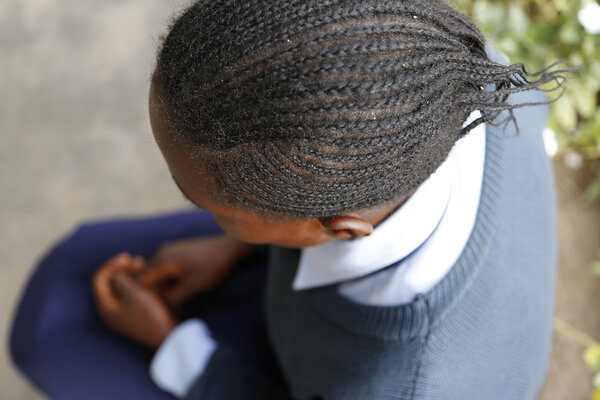
Pregnant Girls’ and Adolescent Mothers’ Struggles to Stay in School in Mozambique
"Mozambique’s government faces enormous challenges in advancing adolescent girls’ and women’s right to education. Many girls face discrimination, gender-based violence, and poverty. The country has the fifth highest rate of child marriage in the world. Its adolescent pregnancy rate is the highest in East and Southern Africa: 180 out of 1000 girls and young women ages 15 to 19 gave birth in 2023, in contrast with the regional average of 94 births “GIRLS SHOULDN’T GIVE UP ON THEIR STUDIES” 2 per 1000 girls. At least 1 in 10 girls has had a child before the age of 15, according to the United Nations. A 2019 study of data collected over time of primary school dropouts in Mozambique found that 70 percent of pregnant girls, many of whom were still enrolled in primary school past puberty due to their late enrollment, dropped out of school."

The production licensing agreement between the Population Council and Kiara Health, a South Africa-based pharmaceutical manufacturing and health solutions company, will increase regional supply to 1 million PreP rings annually.
"Good news for the thousands of girls and women in the sub-Saharan Africa region: A new licensing agreement is set to double the continental supply of a game-changing, long-acting HIV prevention tool. Made of flexible silicone, the dapivirine vaginal ring, or DPV-VR, which slowly releases the antiretroviral drug dapivirine in the vagina over one month, is the first long-acting HIV prevention method that is approved for use in women aged 18 and above. It has been described as an HIV prevention “breakthrough” and is reported to reduce the risk of HIV infection in women by over 50%."

"We, sixteen representatives of communities affected by tuberculosis (TB) and with experience related to TB in pregnancy, met in Washington, D.C., on October 25– 28, 2023, to develop a consensus on the inclusion of pregnant and breastfeeding women and persons* in TB treatment and vaccines research. The community meeting was part of a larger convening hosted by the Supporting, Mobilizing, and Accelerating Research for Tuberculosis Elimination (SMART4TB) Consortium, the International Maternal Pediatric Adolescent AIDS Clinical Trials (IMPAACT) Network, and the World Health Organization (WHO) Global TB Program (Tuberculosis and pregnancy: Laying the groundwork for consensus on inclusion in research)."

Ein Appell von Philippe Neyroud, ehemaliger Direktor von Comundo Suisse Romande und den beiden Journalist:innen Marisol Hofmann und Thomas Niederberger
Die Organisation Comundo ist in Bolivien und Peru tätig. Gemeinsam mit den Journalist:innen Marisol Hofmann und Thomas Niederberger beobachtet sie, welche Auswirkungen der wahllose und missbräuchliche Einsatz von Pestiziden in der Landwirtschaft auf die öffentliche Gesundheit hat und welche Umweltschäden durch den Bergbau verursacht werden. Zwei Realitäten und eine Gemeinsamkeit: die nachweisliche Beteiligung multinationaler Schweizer Konzerne.

Interview von Helvetas Politsichten mit Nachhaltigkeitsexpertin Eva Schmassmann
"Die Ambitionen sind zu tief, die Fortschritte zu klein. Bei diesem Tempo wird die Schweiz die Ziele der Agenda 2030 für nachhaltige Entwicklung verfehlen. Wo es beim neuen Aktionsplan 2024-2027 hapert – und was es bräuchte, damit die Schweiz die SDGs doch noch erreicht. - Frage: Eva Schmassmann, wo steht die Schweiz bei der Umsetzung der Agenda 2030? Antwort: Die Schweiz ist insgesamt nicht auf gutem Wege, die Nachhaltigkeitsagenda der UNO umzusetzen. Das hat bereits der Länderbericht aufgezeigt, den die Schweiz 2022 vor der versammelten Staatengemeinschaft in New York präsentiert hatte. Darin stellt der Bundesrat durchaus selbstkritisch fest: Das Tempo reicht nicht. In manchen Bereichen ist sogar die Richtung falsch, sodass die Schweiz sich von der Zielerreichung einzelner SDGs entfernt."

"Der Bundesrat hat heute die Eckwerte zum Budget 2025 präsentiert. Vorgesehen ist darin auch die Kürzung bei der internationalen Zusammenarbeit (IZA) um 1.4%. Noch vergangenes Jahr hatte er mit der Botschaft über die IZA 25 - 28 eine Erhöhung um 2,5% vorgesehen, um damit den Wiederaufbau der Ukraine zu finanzieren. Der Bundesrat hat nur einen Ausweg aus dem Schlamassel: Er muss die Vernehmlassung zur IZA-Botschaft ernst nehmen und den Wiederaufbau ausserordentlich finanzieren."

Die globale Gesundheitsgemeinschaft kann es sich angesichts von 4-5 Milliarden Menschen auf der Welt, die keinen Zugang zu den grundlegendsten Gesundheitsdiensten haben, nicht leisten, auf dem nächsten hochrangigen UN-Treffen zum Thema UHC im Jahr 2027 zusammenzukommen und erneut den mangelnden Fortschritt zu beklagen.
Der Artikel diskutiert die Herausforderungen bei der Umsetzung der allgemeinen Gesundheitsversorgung (Universal health coverage - UHC). Er betont, dass obwohl viele Länder sich verpflichtet haben, bis 2030 eine allgemeine Gesundheitsversorgung anzubieten, der Fortschritt in diesem Bereich stagniert oder sogar zurückgegangen ist. Es werden vier Hauptprobleme, die sog. "Elefanten im Raum" identifiziert, die angegangen werden müssen, um den Fortschritt für UHC wieder voranzutreiben. Der erste Elefant symbolisiert die fehlende politische Verpflichtung. Viele Regierungen betrachten das Erreichen von UHC als Aufgabe allein des Gesundheitssektors, faktisch erfordert sie jedoch die Zusammenarbeit verschiedener Sektoren. Der 2. Elefant ist die unzureichende und die Fragmentierung der Finanzierung. Als drittes Hindernis wird die mangelnde Gouvernanz und die fortgesetzte Zersplitterung der globalen Gesundheitsbemühungen kritisiert, trotz der Versuche die Kohärenz auf globaler und nationaler Ebene beispielsweise durch den "SDG 3 Global Action Plan" zu verbessern. Der 4. Knackpunkt ist die Art wie UHC kommuniziert wird. Die globale Gesundheitsgemeinschaft ist zersplittert in verschiedene Fraktionen, die sich für unterschiedliche Prioritäten einsetzen. Die Gesundheitsgemeinschaft muss den politischen Entscheidungsträger:innen jedoch klar und deutlich kommunizieren, was UHC ist, damit sie in der Lage sind, umsetzbare Fahrpläne zu finanzieren.
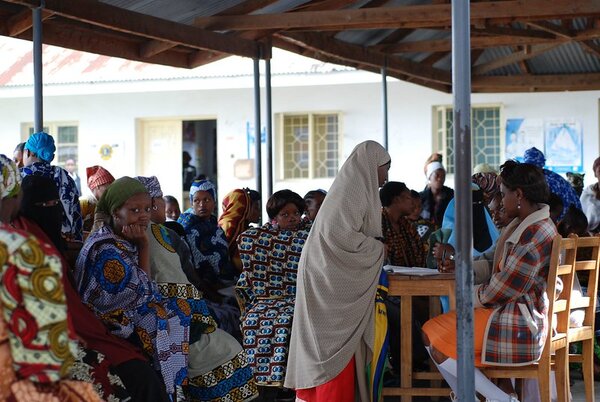
"Challenges related to availability and access to good quality healthcare services contribute to about 15% of deaths in low and middle-income countries (LMICs). However, the attention to quality healthcare in many countries has not been adequate, albeit rising over the years. Several studies highlight challenges in healthcare quality, including the availability of health services, clinical care and patient experience. Recently, a study from Uttar Pradesh (UP) in India analysed the reasons behind significantly higher mortality in newborn babies born in rural private health facilities compared to childbirths in public and private facilities in urban areas. In line with many other observations, the paper has highlighted several reasons relevant to the issue of suboptimal quality of healthcare in LMICs, indicating several systemic and policy challenges."

Global health institutions, controlled by a small group of countries and private foundations, have a fundamental design flaw and they are not fit for purpose. Olusoji Adeyi of Johns Hopkins and Justice Nonvignon of African CDC offer a prescription for donors.
"After decades of lofty promises, mixed successes, catastrophic failures, and billions of dollars spent, the time is ripe to fundamentally change the construct and duration of global health grant-financing institutions and initiatives (GHIs). We acknowledge that GHIs – including multilaterals, bilaterals, and foundations – have contributed to some short-term progress in health service delivery and elements of health system development in Africa, but there remain questions about the sustainability of such progress. Our reflections and propositions address the more fundamental issue of medium-to-long term effects of the GHIs’ status quo on Africa: given the power imbalances and collective dysfunctions of GHIs, cui bono? In seeking answers to this puzzle, we encourage readers to ponder the implications for global health of Wole Soyinka’s searing wisdom: “Truth for me is freedom, is self-destination. Power is domination, control, and therefore a very selective form of truth, which is a lie.”
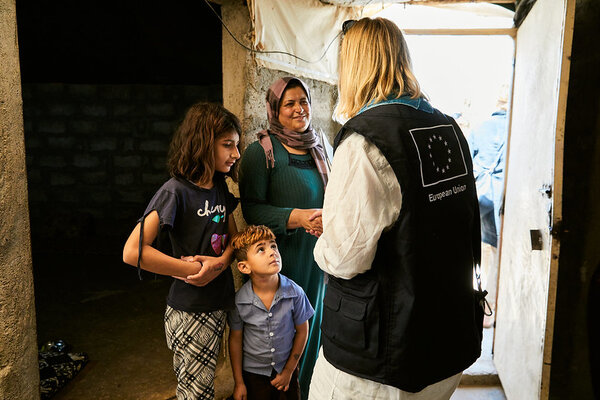
As global development grapples with a movement to “shift the power,” the sector must recognize that aid needs to be separated from geopolitics.
"For decades, critics have been claiming that aid is a key mechanism of foreign policy, highlighting that aid is inherently political. Politics, in turn, is controlled by geopolitical trends which are about amassing power and wealth. This is a fact that the global development sector as a whole has tended to conveniently ignore. The Western aid institutions that have been going through a reckoning and are talking about “shifting the power,” “decolonization,” or “localization,” were never altruistic. They were and remain political institutions based on state ideology of resource extraction and control."
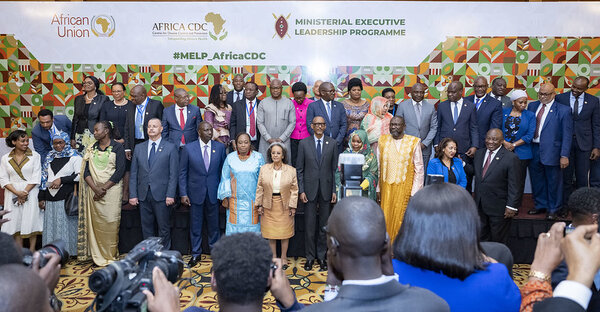
Second independence of Africa
"The Africa Centres for Disease Control and Prevention (Africa CDC), has announced the creation of a pooled African medicines procurement mechanism at the 37th African Union Summit, which ended yesterday. The mechanism aims to spearhead “a new era of predictable demand for African manufacturers, empowering them to plan for the long-term and establish a robust market worth over $50 billion,” said the CDC in a press release on Monday, just after the close of the Summit in Addis Ababa. (...) With regards to the new African CDC medicines procurement mechanism, Africa CDC Director General Dr. Jean Kaseya said: “The decision means the creation of a robust market for manufacturers and ensures the health security of all Africans. This will be the second independence of Africa.”
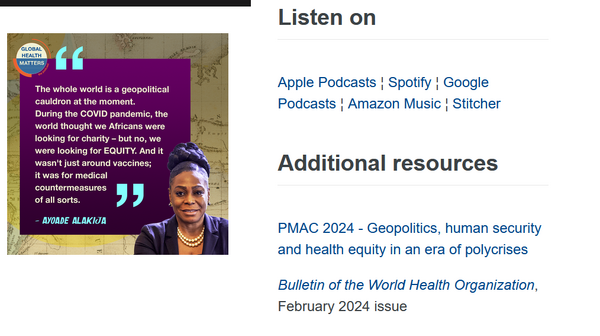
Geopolitics of global health - part 2
"In part 2 of our episode on the geopolitics of global health, host Garry Aslanyan speaks with Ayoade Alakija, who says "everyone in the health sector must have a basic understanding and training in geopolitics." Ayoade is the co-chair of the African Union’s African Vaccine Delivery Alliance and WHO Special Envoy and co-chair for the ACT-Accelerator. She speaks about the world becoming a “geopolitical cauldron” and how that directly influences global health practice and policy."

India is under pressure from EFTA, apparently led by Switzerland, which is home to several pharmaceutical giants such as Novartis and Roche.
"Commerce minister Sunil Barthwal has clarified that India will not sign a new trade agreement with the European Free Trade Association (EFTA) that would limit access by the country’s thriving generic medicine industry to new drug formulations for critical diseases. India is currently negotiating a new trade deal with the EFTA, which includes Iceland, Liechtenstein, Norway, and Switzerland. And leaked excerpts of the draft agreement had raised concerns among patients and advocates due to provisions limiting access and use by generic manufacturers of clinical trial data from originators’ drug trials, for a period of “up to six years.”

"Over 50 civil society groups have written to the leaders of the world’s biggest medicine procurement programmes urging them to reject “secrecy clauses” in their agreements with pharmaceutical companies. The letter, which has been shared exclusively with Health Policy Watch, was sent to the heads of UNICEF, the Pan American Health Organization (PAHO), vaccine alliance Gavi, The Global Fund to Fights AIDS, Tuberculosis and Malaria and the US President’s Emergency Plan for AIDS Relief (PEPFAR) on Tuesday. The civil society groups, which include the People’s Vaccine Alliance, Public Citizen, Health GAP and a multitude of local patient advocacy groups, express “deep concern about the increasing use of confidentiality and non-disclosure clauses” in contracts between drug manufacturers and government, multi-stakeholder and humanitarian buyers."

"NEW YORK/GENEVA/ROME, 21 February 2024 – In the less than five months that followed the brutal 7 October attacks and the ensuing escalation, tens of thousands of Palestinians – mostly women and children – have been killed and injured in the Gaza Strip. More than three quarters of the population have been forced from their homes, many multiple times, and face severe shortages of food, water, sanitation and healthcare – the basic necessities to survive. The health system continues to be systematically degraded, with catastrophic consequences. As of 19 February, only 12 out of 36 hospitals with inpatient capacity are still functioning, and only partially. There have been more than 370 attacks on health care in Gaza since 7 October."

ABS emerges as a cornerstone of potential outcome. By Priti Patnaik & Nishant Sirohi
"There is a distinct shift in the mood. Despite continuing divergences on key issues from technology transfer, financing, to access and benefit sharing, some countries are beginning to see a small possibility of concluding negotiations for a new Pandemic Instrument. However, the near-impossibility of reaching consensus on complex, technical matters within such a short time period, looms large in the hallways of the World Health Organization. With the number of remaining formal negotiating days ahead of May 2024 dwindling to single digits, WHO member states, nevertheless, continue to be keen on concluding talks to reach agreement in addition to finalizing amendments to the International Health Regulations. This emerging optimism could suggest two possibilities: a more likely one that could result in a watered-down agreement to meet the deadline, essentially a face-saving exercise; a second scenario - albeit somewhat rose-tinted, is that they would actually be able to put together a reasonable set of commitments that broadly meets the needs of most countries."
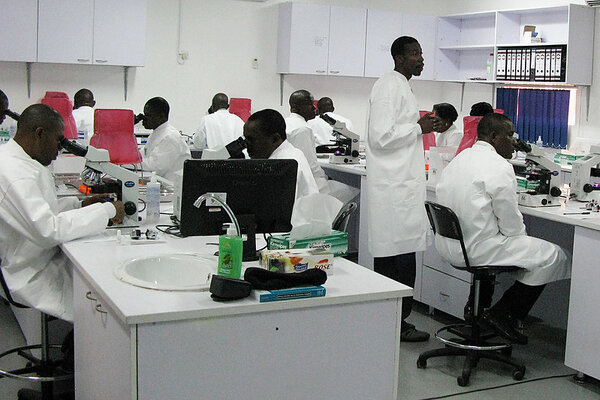
"A group of African scientists is urging their governments to demand a review of the role of global North-based international health organisations in shaping the new global pandemic preparedness and response treaty before its finalisation at the World Health Assembly in May. The group – known as the Pan-African Epidemic and Pandemic Working Group – says international health policies should prioritise low-income countries with high disease burdens, criticising the current draft as “colonialist”."
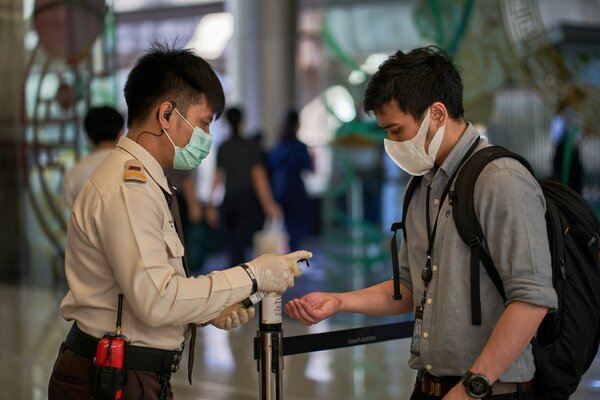
Far from making amends, a handful of powerful countries are sabotaging the best chance to translate the lessons from the COVID-19 pandemic into legally binding commitments that will protect us all.
"The Intergovernmental Negotiating Body (INB), which is tasked under WHO with drawing up an international instrument on pandemic prevention, preparedness, and response, will sit for the 9th and final time from March 18–29. In the 2 years since it first met, hundreds of hours and unknown costs have been spent, but the political impetus has died. The convention is now at a critical juncture: the final text for countries to ratify is due to be presented at the World Health Assembly in May. With only limited days of negotiation left and a long way to go to secure a meaningful agreement, it is now or never for a treaty that can make the world a safer place."
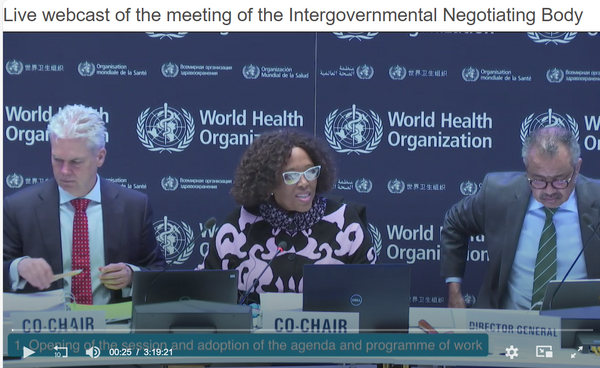
Strong Push for Access and Benefits Sharing Mechanism. By Priti Patnaik & Nishant Sirohi
"Scores of developing countries pulled their weight in a bid to push for equity provisions in a new Pandemic Agreement at the opening of the latest meeting of the Intergovernmental Negotiating Body (INB), set up to establish a new Pandemic Agreement. Despite strong intentions, it looks increasingly difficult that objectives to ensure equity in pandemic preparedness and response, will translate into any serious binding obligations, given limited political will and time. WHO member states are meeting for a two-week marathon meeting where they continue to discuss a proposal for a negotiating text put together by the Bureau of the INB, that to an extent reflects some of the deliberations conducted in smaller groups on a number of different key provisions."
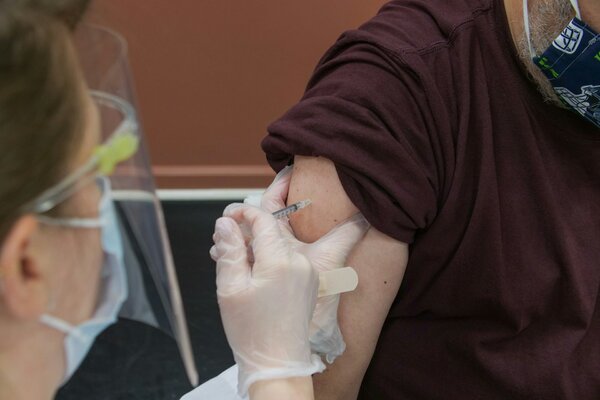
"Health Policy Watch has obtained portions of the latest draft of the pandemic agreement that member states will negotiate over at the eighth intergovernmental negotiating body (INB) starting on Monday, 19 February. At the time of publishing, only member states had access to the draft, although a number of civil society organisations recognised as stakeholders have requested a draft from the World Health Organization (WHO) Bureau that is overseeing the negotiations for some time."
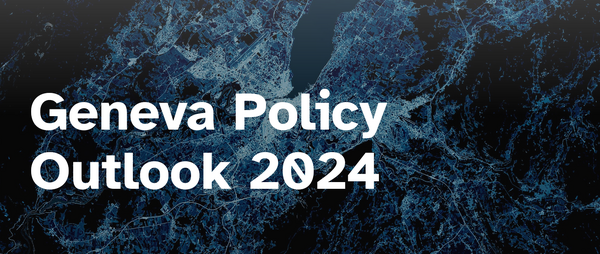
The Geneva Policy Outlook is an initiative led by the Geneva Graduate Institute in partnership with the Republic and State of Geneva, the City of Geneva, and the Fondation pour Genève.
"As a finger on the pulse of Geneva’s global policy space, the Geneva Policy Outlook 2024 (GPO24) gathers a selection of articles aimed to stimulate reflection on and provide practical impulses for international cooperation and global governance. It draws on the many exchanges throughout the year with senior policymakers from “International Geneva”, which serves as a global hub to address challenges through cooperation, dialogue and negotiation. While the GPO24 does not have the ambition to offer an all-inclusive coverage of policy issues, it does highlight the ‘can do’ attitude in Geneva’s policy circles."

"The Global Initiative on Digital Health (GIDH) is a WHO managed network of stakeholders organized to facilitate the implementation of the Global Strategy on Digital Health 2020-2025 and other WHO norms and standards for Digital Health System Transformation. The Initiative will serve as a platform to enable a wide global ecosystem to work collectively to promote country capacity and strengthen international cooperation in digital health. GIDH will prioritize the following core areas of work: assessing and prioritizing Member States’ needs, evaluating the availability and reporting of country-level digital health resources and identifying under-funded priorities, supporting technically and financially the accelerated achievement of the strategic objectives defined in the Global Strategy on Digital Health 2020-2025, building capacity and converging efforts to encourage developing, maintaining and adapting digital health technologies to continuously changing needs."

Bewerbungsfrist: 10. März 2024
Die Schweizer Partnerschaft HAS Haiti (SPHASH) ist ein gemeinnütziger Verein mit Sitz in Ilanz/Graubünden mit ungefähr 400 Mitgliedern und Sponsoren in der ganzen Schweiz. Einziger Zweck ist die ideelle, personelle und materielle Unterstützung des Hôpital Albert Schweitzer (HAS), Haiti. Der Verein hat über Jahre eine sehr erfolgreiche Basis aufgebaut. Aufgrund einer Nachfolge-Regelung ergibt sich die Möglichkeit für eine erfahrene Persönlichkeit, die nächste Phase des Vereins mitzugestalten und damit in eine weiterhin sehr erfolgreiche Zukunft zu führen. Aus diesem Grund suchen wir für die Schweiz, mit flexiblen Arbeitsort, per sofort oder nach Vereinbarung eine:n Geschäftsführer:in. Zusammen mit dem ausschliesslich ehrenamtlich tätigen Vorstand sind Sie prägend daran beteiligt, die Organisation zu formen und zu entwickeln. Wir freuen uns auf Ihre vollständige Bewerbung inkl. Lebenslauf und Motivationsschreiben bis zum 10. März 2024 an jobs@sphash.ch. Für weiterführende Informationen kontaktieren Sie den Präsidenten des Vereins, Benjamin Simeon, Telefon 079 290 49 79, email benjamin@sphash.ch oder den aktuellen Geschäftsführer, Rolf Maibach, Telefon 079 681 86 35, email rolf@sphash.ch.

Université de Lausanne "Cette soirée sera l’occasion de présenter le dispositif de soutien et d’encouragement des projets de recherche partenariale (recherche participative, recherche-action, recherche collaborative), de découvrir les expériences et expertises développées ces dernières années et de rencontrer nos partenaires autour d’intérêts communs. Un buffet sera servi à l’issue de la cérémonie. Le fonds de soutien à la recherche partenariale vise à soutenir des projets de recherche innovants et à fort impact social, développés entre des collaborateur·ices de l’UNIL ou des étudiant·es et des partenaires externes (communes, associations, ONG, services de l’Etat, etc.). L’entrée et libre, mais l’inscription est obligatoire."

Swiss TPH In resource poor settings, health intervention managers and planners must give weight to strategies to successfully implement health projects and programmes, without losing sight of the demands and needs of populations. Therefore, the aim of this course is to equip participants with the knowledge and skills relevant to strategic planning, including approaches and tools for analysing the present situation (situation analysis), identifying problems and incorporating relevant stakeholders (priority setting).

Novartis Foundation "Together, we will discuss how cities can harness data and AI to tackle heart health inequities. This dialogue will convene global and city leaders in health equity and access, philanthropy, urban development, technology, data science and analytics to explore why data and multisector partnerships are essential to move the needle on population health and address the burning health issues of our time. Confirmed speakers: Please see attachment. JOIN US to explore together how cities can translate data insights into action and policy to tackle heart health inequities!"

Graduate Institute - Global Health Centre "(...) Deteriorating mental health in militarised territories is not exclusive to recent conflicts. The low-intensity but protracted military operations in the disputed territory of Jammu and Kashmir over more than three decades have contributed to the prevalence of depression in the region. Conflict-affected areas are also often characterised by insufficient resources for mental health. Humanitarian agencies struggle to provide even minimal levels of mental healthcare for populations in conflict zones. As violence intensifies and is prolonged, mental health comes to be characterised as a low-level priority or even as a luxury. This event aims to bring together experts to discuss different aspects of mental health crises and care, drawing on recent and ongoing cases."
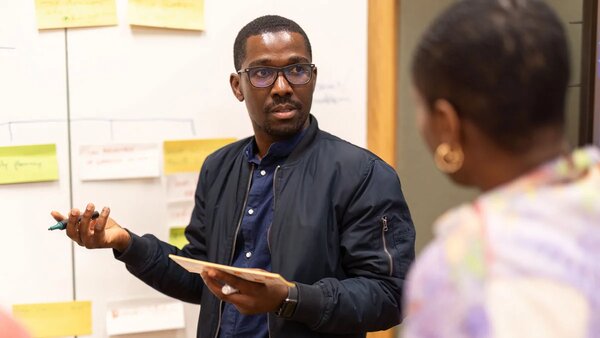
Swiss TPH The course analyses the relationships between global health strategies and national and local health policies and systems development. It focuses then on health systems frameworks, the role and behaviour of institutions and stakeholders, the major innovations in financing and delivering health services, and on how health systems are responding to global changes.
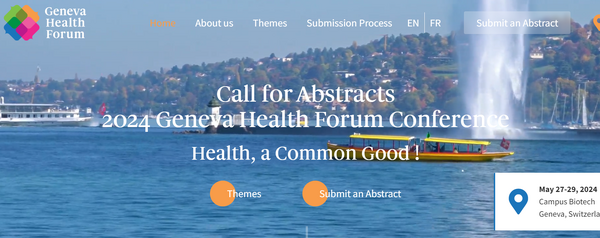
Geneva Health Forum "Universal healthcare coverage stands prominently among the World Health Organization’s (WHO) three strategic priorities. The rise in health disparities worldwide underscores the inadequacy of relying solely on market mechanisms to ensure access to healthcare. In response, the WHO is advocating for the development of “common goods for health,” which encompass population-based functions or interventions demanding collective financing, whether by governments or donors."